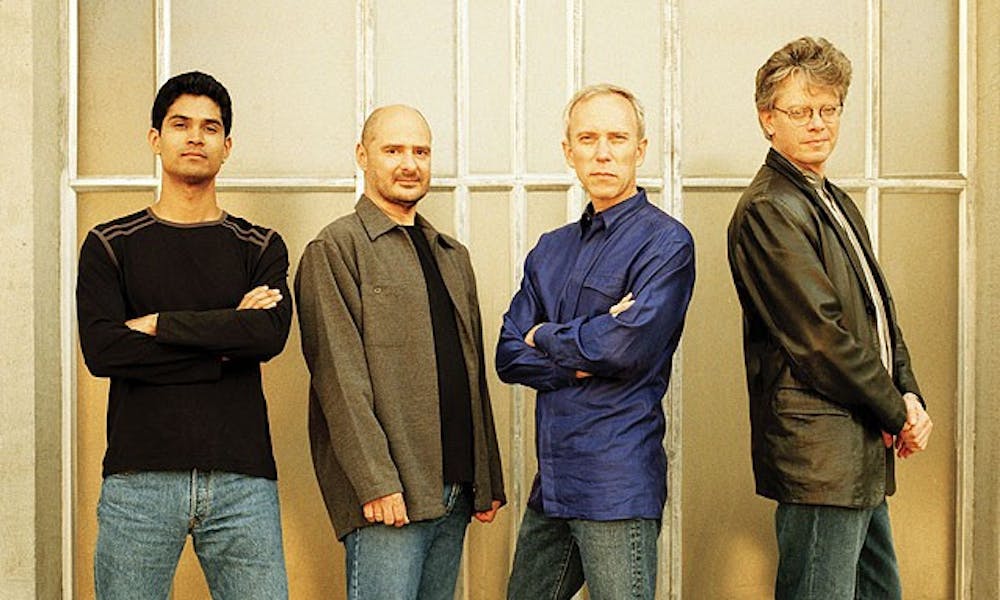There are two years that are important in the saga of composer Steve Reich’s WTC 9/11, which will be premiered this Saturday by Kronos Quartet during a concert hosted by Duke Performances.
In 1973, Reich first conceived of joining pre-recorded voices harmonically by lengthening the last vowel or consonant sound, but at that time lacked the technology to do so. In 2001, the World Trade Center—which stood only four blocks from a loft Reich’s family inhabited for 25 years—was attacked. Eight years later, when David Harrington, the leader of the new music ensemble Kronos Quartet, asked Reich for another piece involving sampled voice, Reich decided to use recordings from Sept. 11 to create his composition and applied the now-possible technique he had long considered.
“Using speech as a source of ‘taped’ music or ‘electronic’ music was to me much more interesting then using oscillators or synthesizers because there’s human content there; there’s human meaning there; and there’s a musical richness in sound far beyond any oscillators or synthesizers,” Reich said.
Along with WTC 9/11, Kronos will play their full catalog of pieces commissioned by Reich, including the quartets Different Trains, Triple Quartet and selections from opera The Cave, following a residency that begins tonight with a conversation at the Pinhook.
Different Trains, Triple Quartet and now WTC 9/11 all share a common genre that Reich has worked in exclusively with Kronos: that of the string quartet, performing live along with recorded sounds and voices.
In creating these works, Reich notated the voices for string accompaniment, creating a link between the imported world of the recordings and the actual stage performance.
“The way that I’ve done this for 25 years now is to link the documentary material and the musical material and give a stamp of authenticity to the music that would otherwise be impossible,” Reich said.
Different Trains, which was first performed by Kronos in 1988, parallels the cross-country train rides Reich took between his divorced parents as a child with those of Jewish Holocaust victims. As a Jew, Reich knew that had he grown up in Europe rather than the U.S., he could have suffered a much different fate. To create that documentary relation, Reich used the voices of his nanny as well as Holocaust survivors, among others, as basis and content for the piece.
Similarly, WTC 9/11 takes in the first movement the voices of NORAD traffic controllers and FDNY firefighters from the day of the attack. In the second and third movements, Reich uses interviews from 2010 with residents of his neighborhood, emergency workers and women who presided over bodies as part of the Jewish obligation of Shmira, as well as a cellist and cantor from a NYC synagogue.
Shmira comes from the belief that the soul hovers over the body until burial, Reich said, and in his piece, “WTC” stands not only for “World Trade Center” but also “World To Come.”
Reich’s first collaboration with Kronos was Different Trains, and Reich spoke highly of Kronos founder and violinist David Harrington, who reached out to the composer at first.
“They have become a string quartet, which is one of the oldest and most traditional of western musical vehicles, and they are also like a rock group, and that’s an incredible accomplishment,” Reich said. “David Harrington’s intensity of dedication to every project the Kronos Quartet gets involved in is a force to be contended with.”
Discussing his motivations for first contacting Reich, Harrington said he sought out the unique collaborations that Reich could offer the quartet.
“Out of the more than 700 pieces written for Kronos, the common denominator in every one of the new pieces is that the person might be able to make something distinctive and totally unique. That’s what really led me to Steve in the first place,” Harrington said. “[With Different Trains], there was going to be something in our music that had never been there before.”
Reich said Kronos’ bow marks were integrated into the written notation of the pieces, so significant was the group to their development. He also placed a high value on the sonic gravity of the quartet as a necessity for creating works like Different Trains and WTC 9/11. And Harrington had a similar regard for the value and impact of Reich on Kronos.
“When we started playing [Different Trains] in concert, all of a sudden we needed our own sound engineer.... Kronos became a quintet,” Harrington said. “What’s happened is the palette of musical colors and musical possibilities, and the kind of information that can be a part of a concert now, has just exploded, and you have to trace that back to Different Trains.”
With the upcoming Kronos concert, Duke Performances provides an opportunity to see this two-decade long collaboration played out in one evening, Director of Duke Performances Aaron Greenwald said. He added that WTC 9/11 could have premiered at any of the other co-commissioners, which include Carnegie Hall.
But WTC 9/11’s significance goes beyond any mention of individuals or musical history, reaching back to the event of its namesake that influenced countless people around the world.
“The sonic exploration that [Reich] made of that event is staggering,” Harrington said. “In fifteen minutes [the length of WTC 9/11], you really do have so many feelings, and for those people that remember [Sept. 11], it takes you back there and in some way or another, I believes, transforms that event.”
Kronos Quartet performing Steve Reich, including the world premiere of WTC 9/11, will take place Saturday, March 19 at 8 p.m. in Page Auditorium. Tickets can be purchased for $52, $42 or $24 by the general public and $5 by Duke students at the Duke Box Office or tickets.duke.edu. Kronos and Reich will also have a residency starting tonight up until the performance. For more information, visit dukeperformances.duke.edu.
Get The Chronicle straight to your inbox
Signup for our weekly newsletter. Cancel at any time.

